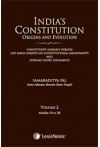
- Author(s): Samaraditya Pal
- Publisher: LexisNexis
- Edition: Ed January 2015
- ISBN 13 9789351433354
- Approx. Pages 1278 + Contents
- Delivery Time Normally 7-9 working days
............................................................................................................................
Description
Articles 19 to 28
At the very outset, we would like to express our regret for certain avoidable technical lapses in the "Introduction" in Volume 1. ' In this volume we have taken care to remove the lapses. This volume continues to deal with fundamental rights beginning with Article 19 and ending with Article 28. Each of these articles is of immense importance and enshrines our rights to a number of freedoms. Article 19 by itself originally conferred seven freedoms, namely, freedom of speech and expression; freedom to assemble peaceably and without arms; freedom to form associations or unions or co-operative societies2; to move freely throughout the territory of India; freedom to reside and settle in any part of the territory of India; right to acquire, hold and dispose of property; and right to practise any profession, or to carry on, any occupation, trade or business. Of these seven rights the one relating to property was deleted by the Constitution (Forty-fourth Amendment) Act, 1978. In a real sense Article 19 contains six fundamental rights in clause (1) and six restrictions in clause (2). This has had obvious repercussions on the size of the volume. Article 20 assures that a person can be held guilty of an offence if only it was so at the time of commission i.e. it prohibits punishment for violation of ex post facto laws. The Article also confers the status of fundamental rights to two well established principles of criminal law, namely, bar of double jeopardy and self incrimination.
............................................................................................................................
Contents
PART III (Contd..): Fundamental Rights
Right to Freedom
Right against Exploitation
Right to Freedom of Religion
Appendix I
Appendix II
Subject Index
............................................................................................................................
